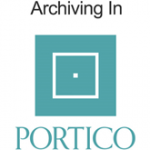Digital Archiving Policy
In order to ensure the preservation, usability and accessibility content for long term availability, there is a need for management policies and actions, called as Digital preservation policy.
Principle of Digital Archiving
- Intellectual Property: Biomedical and pharmacology journal is committed to provide access to digital materials while respecting and upholding the intellectual property rights of authors and obtaining prior consent.
- Access: Digital preservation activities are performed with the primary goal of long-term access to digital collections.
- Authenticity: It ensures that data remain unaltered and the original data is preserved.
Challenges to the preservation of digital data
- Technology (at the level of: hardware, system software, application software, data and file formats, storage media readers and drivers)
- Lack of metadata which results in the failure to locate information, also the inability to render and read the information, due to the lack of contextual information.
- The media used to store digital records are usually unstable and deteriorate within a few years or decades at most, rendering the digital records inaccessible.
- Incompatible File formats, especially for older software.
- Digital records may be lost in the event of natural calamities such as fire, flood, earthquake, equipment failure, or virus attack that disables stored data and systems.
- The digital records may be well protected, but so poorly identified and described that potential users cannot find them.
- Discontinuation of journal due to any reason leads the published research to extinct, digital preservation keeps the research available.
Self-Archiving Rights
All authors hold full copyright and self-archiving rights. Our self-archiving policies are detailed in the RoMEO (ResearchersLinks is a green publisher at RoMEO, which is a database of publishers’ copyright and self-archiving policies).
Additionally, authors are allowed to archive their articles in open access repositories as “pre-prints”.
BPJ is archived in Portico
Portico was the first digital preservation service to be independently audited by the Center for Research Libraries (CRL) and certified as a trusted, reliable digital preservation solution that serves the needs of the library community (following the general metrics found in their Trustworthy Repositories Audit & Certification). The stated purpose of the CRL audit was to promote understanding of and, where justified, confidence in, digital repositories.







